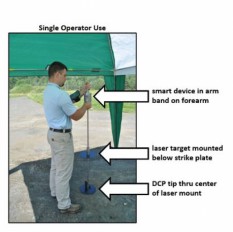Do you know the difference between CPT and DCP? Read Vertek's post & find out! Sponsored

Dynamic Cone Penetration (DCP) testing equipment, procedure and main difference against Cone Penetration Testing (CPT) is the subject of Verket's latest post. Read on for more details!
Dynamic Cone Penetration (DCP) testing is used to measure the strength of in-situ soil and the thickness and location of subsurface soil layers. It may use the same equipment as traditional CPT, however testing procedure is different. Additionally, the obtained data consistency may be compromised in various ways, thus lowering the method's reliability.
In its latest post, Vertek outlines the basic differences in equipment, testing procedures, quality of obtained data between the two in-situ testing methods. It also discusses the drawbacks of the DCP method and provides useful guidelines as well as the latest developments on getting more accurate and reliable data, when using the DCP method.
Read the full article here !
Source: VertekCPT
Want to read more like this story?

Vertek CPT University: Soil profile determination based on CPT data
Jan, 20, 2015 | NewsCone Penetration Testing is a widely used technique for soil profile determination, allowing geotech...

Learn about Vertek's Smart DCP
Sep, 10, 2015 | NewsVertek is glad to present Smart DCP, the app for instant data logging and laser accuracy! DCP (Dy...

CPTu: Vertek's news on the value of pore pressure CPT data
Feb, 04, 2015 | NewsUnlike conventional CPT cones, modern devices come with a special pore pressure sensor. Vertek analy...
Cone Penetration Testing (CPT) Webinar
Apr, 22, 2019 | EventDr. Peter Robertson, technical advisor at Gregg Drilling, will be offering short 30 minute to 1 hou...

VertekCPT: capturing the basics from CPT test results!
Sep, 11, 2014 | NewsKnowing what Cone Penetration Testing is and the process of soil testing is only a small fraction co...

Vertek CPT University: Why CPT equipment is a versatile choice for detecting contamination?
Feb, 18, 2015 | NewsCone Penetration Testing equipment was originally designed and still its most common use, is to char...

Vertek CPT: How pore pressure data is used to correct and analyze CPT data?
Feb, 27, 2015 | NewsIn continuation to the previous article provided by Vertek CPT University, pore pressure s...

Vertek: Need help in selecting optimum cone penetrometer size?
Apr, 08, 2015 | NewsCPT cones are available in multiple sizes, with the 10cm2 being the industry standard. Larger and sm...

Webinar on Basic Principles of High Strain Testing and Understanding Results
Mar, 03, 2020 | EventPile Dynamics, Inc. (PDI), will present a one day webinar on Basic Principles of High Strain Testin...
On This Day
April 19th 1916
READ MORE
Trending

2023 Geotechnical job market analysis

World's most intricate subway networks

The causes of the Whaley Bridge dam failure

PLAXIS 2024.1 New release is out!

Underground tunnel and Yonge Station project in downtown Toronto

RocSlope3 and RocFall3’s Integrations for Rock Slope Analysis


